
For centuries, circumcision has been practiced in cultures around the world, often wrapped in layers of tradition, religion, and medical justifications. However, as society grows more informed and willing to question long-standing norms, the procedure is increasingly coming under fire.
Despite its prevalence, circumcision raises profound ethical, medical, and personal questions.
Here are the five most compelling arguments against circumcision—arguments that demand we rethink this deeply entrenched practice.
1. The Ethical Dilemma: Consent is Nonexistent
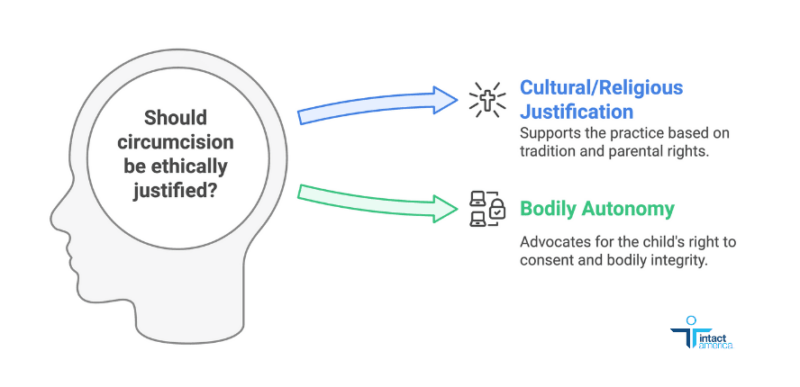
Circumcision is performed on infants who cannot consent—a fundamental violation of bodily autonomy. In other areas of medicine, irreversible procedures on non-consenting individuals are considered unethical unless absolutely necessary. Why should circumcision be an exception?
Parents often cite cultural or religious beliefs to justify the decision, but these reasons prioritize the parents’ values over the child’s bodily integrity.
The foreskin is not a harmful anomaly; it’s a normal, functional part of the body. By removing it, parents make an irreversible decision that belongs to the child.
Imagine if the same logic were applied to other body parts. Would it be acceptable to remove a healthy toe or earlobe from a baby simply because it aligns with tradition?
The ethics of circumcision demand scrutiny, as they reveal a disturbing precedent: that society is willing to overlook an individual’s right to bodily autonomy for the sake of cultural comfort.
2. The Medical Myths: Misleading Justifications
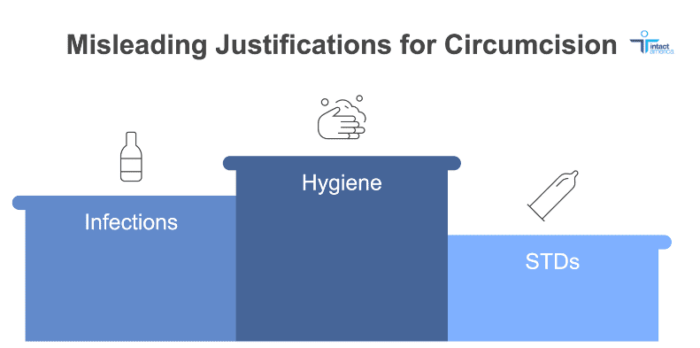
Proponents of circumcision often argue that it prevents infections, reduces the risk of certain sexually transmitted diseases, and improves hygiene. But when you dig into the science, these claims crumble under scrutiny.
a. Infections: While circumcision may slightly reduce the risk of urinary tract infections in infancy, these infections are already rare and can be treated with antibiotics. Surgery to prevent such a minor risk is extreme and unnecessary.
b. STDs: The claim that circumcision reduces the risk of HIV transmission in heterosexual men is based on studies from sub-Saharan Africa. The applicability of these findings to other populations is questionable, especially in places where condoms and safe sex practices are readily available.
c. Hygiene: Proper hygiene—something even toddlers can learn—is sufficient to keep the foreskin healthy. Are we really advocating surgery as a substitute for soap and water?
Medical organizations around the world, including many in Europe, do not recommend routine infant circumcision. The procedure is framed as a preventative measure, but in reality, it’s a preemptive surgery performed without clear necessity.
3. The Functionality of the Foreskin: It’s There for a Reason
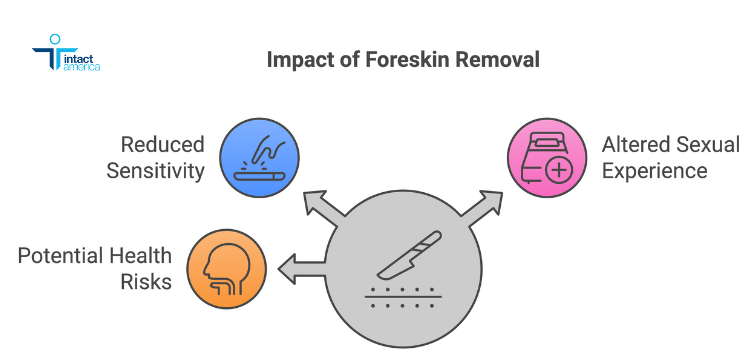
The foreskin is not a vestigial flap of skin; it’s a highly sensitive, functional part of the male anatomy. Packed with nerve endings, it plays a crucial role in sexual pleasure and protection.
The foreskin acts as a natural lubricant, reducing friction during intercourse. It also protects the glans (the sensitive tip of the penis) from external irritants and desensitization. Removing it fundamentally alters the sexual experience—not just for the circumcised individual but also for their partners.
This isn’t just speculation. Studies have shown that circumcised men may experience reduced sensitivity, which can impact sexual satisfaction. By removing the foreskin, we are tampering with a complex system of natural anatomy designed for a purpose—a fact that is often overlooked in discussions about circumcision.
4. The Psychological Toll: Trauma That Stays Hidden
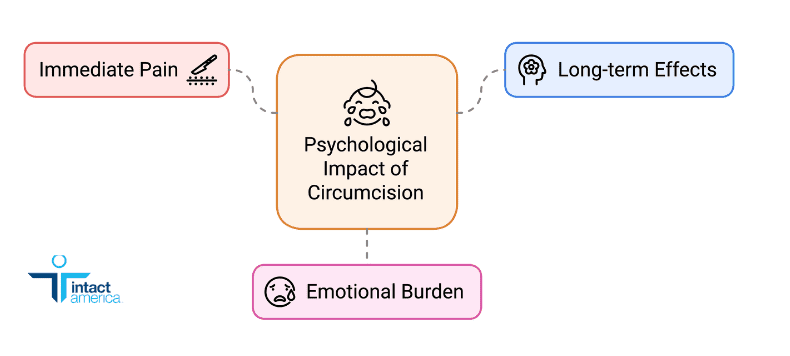
Circumcision is often framed as a quick, painless procedure. The truth is far from it.
Infants subjected to circumcision without anesthesia experience acute pain, as their nervous systems are fully developed at birth. Research suggests that this trauma can have long-term psychological effects, including heightened sensitivity to pain and stress later in life. Even when anesthesia is used, it doesn’t erase the invasive nature of the procedure.
For some, the psychological impact lingers well into adulthood. Men who learn about the functions of the foreskin later in life often express feelings of betrayal and anger. They weren’t given the chance to decide for themselves and live with the consequences of a choice they didn’t make.
This emotional burden is rarely discussed, yet it underscores the profound violation that circumcision represents.
5. The Rise of the Intactivist Movement: A Global Shift in Perspective
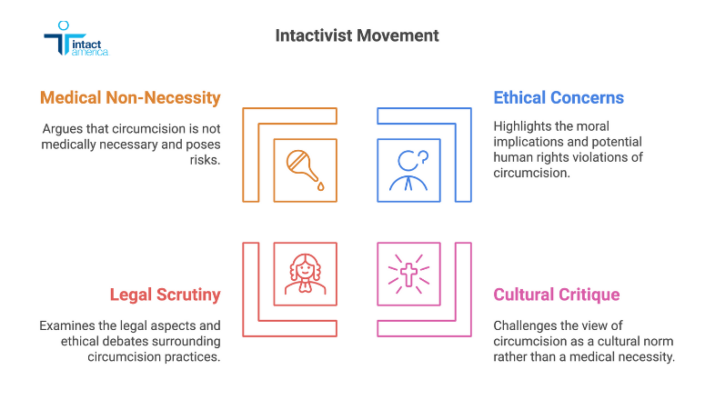
Across the globe, a growing number of people are rejecting circumcision and advocating for what is known as “intactivism.” This movement emphasizes the right of every individual to make decisions about their own body and highlights the inherent risks and ethical concerns surrounding circumcision.
Intactivists argue that circumcision is not a medical necessity but a cultural habit perpetuated by outdated beliefs. Their efforts are bearing fruit: circumcision rates are declining in countries like the United States, and more parents are choosing to leave their children intact.
This shift is also being bolstered by legal and medical changes. In some countries, circumcision is being scrutinized for its ethical implications, with debates about whether it violates human rights. As awareness spreads, more people are asking the hard questions: Why are we doing this? Who benefits? And is this really in the best interest of the child?
Conclusion: A Call to Pause, Reflect, and Rethink
Circumcision is more than a cultural or medical decision—it’s a deeply personal one that should belong to the individual. By examining the ethical, medical, and functional aspects of circumcision, it becomes clear that this practice deserves more scrutiny than it currently receives.
It’s time to move past outdated justifications and confront the uncomfortable truth: circumcision is not a harmless tradition. It’s a procedure with profound consequences, performed on individuals who cannot consent.
The choice to circumcise should no longer rest with parents or cultural norms. It’s a decision that belongs to the person who will live with it for the rest of their life. Until we respect that right, we are perpetuating a cycle of unnecessary harm disguised as tradition.
Join us in defending and honoring bodily autonomy.









Geoff Mew
July 2, 2025 6:08 amThe psychological effects were sensibly covered here. The damaged flesh may heal but the mind often does not!
In The USA the disgusting practice of circumcision continues because it is driven by being a $5 billion annual cash cow.
It is actively promoted in hospitals on an industrial basis not because of any valid medical reason but because of the high fiscal rewards produced. The medics will therefore fight to the bitter end to preserve this and we can expect the struggle to be long and bitter. A glimmer of hope is that women are now at last starting to question circumcision and are actively taking an interest.
The prepuce (foreskin) of a child is rich in stem cells which after removal will often be sold on to the cosmetics industry for very large sums of money. In other words it is a body part harvesting procedure with profit and not medicine in mind! To add Insult to injury, the parents will be charged hundreds of dollars for their child’s contribution to the beauty product industry! Real medical science, whereby stem cells are used in the quest to grow human organs will see proportionately very few of these valuable cells. The unethical approach of hospital staff also needs to be addressed.
Very often young Mothers who have just given birth are frequently pressured to sign documents requesting circumcisions while still exhausted and probably in a depressed state of mind. Certainly in no fit state to have a balanced view on what they are about to sign.
This is the real elephant in the room and it is time this unethical sales pressure style medical scam was stopped!!
Geoff Mew
July 2, 2025 6:12 amThe psychological effects were sensibly covered here. The damaged flesh may heal but the mind often does not!
In the USA the disgusting practice of circumcision continues because it is driven by being a $5 billion annual cash cow.
It is actively promoted in hospitals on an industrial basis not because of any valid medical reason but because of the high fiscal rewards produced. The medics will therefore fight to the bitter end to preserve this and we can expect the struggle to be long and bitter. A glimmer of hope is that women are now at last starting to question circumcision and are actively taking an interest.
The prepuce (foreskin) of a child is rich in stem cells which after removal will often be sold on to the cosmetics industry for very large sums of money. In other words it is a body part harvesting procedure with profit and not medicine in mind! To add Insult to injury, the parents will be charged hundreds of dollars for their child’s contribution to the beauty product industry! Real medical science, whereby stem cells are used in the quest to grow human organs will see proportionately very few of these valuable cells. The unethical approach of hospital staff also needs to be addressed.
Very often young Mothers who have just given birth are frequently pressured to sign documents requesting circumcisions while still exhausted and probably in a depressed state of mind. They will certainly be in no fit state to have a balanced view on what they are about to sign. it is time this unethical sales pressure style medical scam was stopped!!